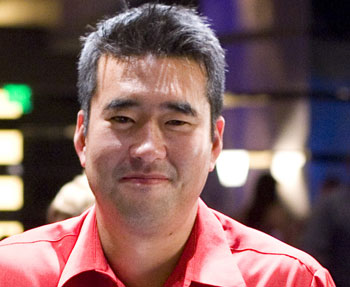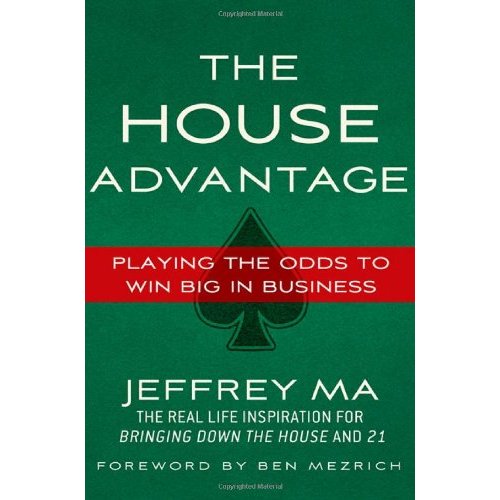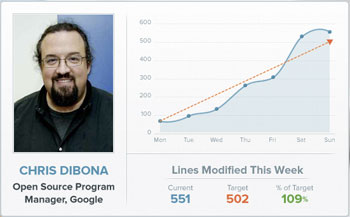 What do a team of card-counting MIT students making millions in Vegas casinos and a personal productivity startup have in common? Not much, perhaps, at first glance. But there are common threads between Jeffery Ma’s high-roller blackjack days and his latest startup, TenXer: data, analytics, and relentless self-improvement.
What do a team of card-counting MIT students making millions in Vegas casinos and a personal productivity startup have in common? Not much, perhaps, at first glance. But there are common threads between Jeffery Ma’s high-roller blackjack days and his latest startup, TenXer: data, analytics, and relentless self-improvement.
Which, really, sum up serial entrepreneur Ma pretty well.

Above: Jeff Ma in his cameo in the movie “21”
TenXer, launched last week, is already Ma’s fourth startup. In the late 1990s he helped start Golfspan, which helped golf players improve their game via video instruction. Then in the early 2000s Ma was the CTO of Circle Lending, an early peer-to-peer microfinance play.
And in 2003-4 Ma and partners founded Citizen Sports, which started out as a Moneyball-style sports consulting firm using advanced analytics to rank and trade players, and morphed into a sports news and fantasy football conglomerate.
But before the startups, before Vegas, and before MIT, there was a father who valued education, and a son who went to a school that taught how students how to think for themselves.
From Worcester to MIT
It’s a long way from growing up in Worcester, MA, a small city an hour out of Boston, to being a high-rolling member of the MIT blackjack team pulling in hundreds of thousands of dollars each weekend.

Ma’s father was a college professor who valued education – particularly education in math, which he drilled into his son for two hours a day during summer vacations.
“My dad basically forced me to be good in math,” Ma recalls with a hint of a smile.
When he was just 13 years old, Ma was sent to boarding school at Phillips Exeter Academy, a century-old Massachusetts institution that emphasizes a Socratic method of education. Students learn through asking questions and debating, and benefit from an extremely low student-to-teacher ratio, about ten to one.
“Those were the most formative years of my life,” Ma told VentureBeat. “What they force you to do there is learn a lot: talk a lot and learn a lot.” That unique combination of learning and communicating gave Ma his two greatest skills: a keen analytical mind, and strong social skills.
He’d need both when becoming a member of the now-famous Massachusetts Institute of Technology blackjack team.
Math, blackjack, and $450K weekends
The MIT blackjack team did not start with Jeff Ma.
It was in operation as early as 1979, twenty years before Ma entered MIT. In the early 1990s, however, it entered a new phase: big business. Three former players professionalized card-counting by raising a million dollars of seed capital and starting an actual, factual company, Strategic Investments.
In a way, it was the first startup that Ma worked at.
 Ma, who started attending MIT in 1990, didn’t take computer courses. Instead, he focused on pre-med and chemical engineering. It was a decision that would force him to learn software engineering on his own, later in life.
Ma, who started attending MIT in 1990, didn’t take computer courses. Instead, he focused on pre-med and chemical engineering. It was a decision that would force him to learn software engineering on his own, later in life.
“It was 1990-94, and all the internet stuff was starting. I made the brilliant decision to not take any computer science courses. I thought all these computers are not going anywhere.”
Keeping his head in the books was a natural for the bright, studious, Ma, but his interest was piqued when his friends kept disappearing every weekend. Then, when his roommate also started going away every weekend, Ma asked some questions. Upon learning that they were going to Vegas to win money playing blackjack, he asked if he could come along. As he realizes now, he was being recruited the whole time.
But it wasn’t a slam dunk. “They told me I could only come if I learned the system,” Ma recalls. The system was, of course, card counting.
You do not enter a card counting ring as a high roller. Instead, you start where beginners usually start: the bottom. At first, Ma was a “donkey-boy,” not there to really make money, but there to play the cards, learn, provide protective camouflage, and carry the cash.
“You have to learn how to count, and learn how to bet,” Ma told VentureBeat. “It’s not higher-level math … you’re just adding and subtracting. But you have to have some social skills.”
Within six months Ma was a big player, counting, placing bets, and winning – most of the time. His experiences, and those of his team members, were immortalized in the book Bringing Down the House and the movie 21, in which Ma had a cameo as a casino employee.
“Our biggest weekend ever was about $450,000. Our worst weekend we lost $250,000.”
After paying off investors, splitting the cash with the team, and expenses, Ma had a very respectable $150,000-200,000 annual take. Not bad for a college student.
But arguably, the biggest benefit came after MIT.
Startups: you have to want to win
Card-counting did a number of things for Ma. It taught him the right attitude for success, for one thing.
“To do well at card-counting, you have to be pretty ambitious. You have to want to be good, and want to win. You need to be competitive.”
But there was more to it that that. By continuing card-counting for a few years after MIT, Ma covered all his living expenses — and then some — and could afford to work on startups and “not worry about money. That’s the biggest thing that blackjack allowed me to do.”
 And he needed some time to find the right ideas and team. Golfspan was a great idea, signing seven of the top 15 golf instructors at the time, but it was ahead of the curve. Video was expensive, distribution in pre-YouTube days was low-quality, and “content was getting hammered.” Ma left after three years as CTO and the company was eventually sold to Demand Media.
And he needed some time to find the right ideas and team. Golfspan was a great idea, signing seven of the top 15 golf instructors at the time, but it was ahead of the curve. Video was expensive, distribution in pre-YouTube days was low-quality, and “content was getting hammered.” Ma left after three years as CTO and the company was eventually sold to Demand Media.
Circle Lending was more of the same. Peer to peer lending via an online service was an unbelievably innovative idea in early 2000. Literally.
“It was a great idea, but it was ahead of its time,” May told VentureBeat. He left the company, perhaps too early. Eventually Circle Lending did gain some traction, and in 2007 it was sold to Richard Branson, becoming Virgin Money for an undisclosed sum that Ma heard was “somewhere in the high eight figures.” Virgin Money eventually crashed and burned, however, in the financial crises of 2008 and 2009, and was shuttered in late 2010.
Protrade was both more interesting and more successful. First of all, it was right down Ma’s strike zone: data, analytics, sports, and competition. Secondly, it led to a profitable exit that Ma actually participated in.
“I had read the book Moneyball, and wanted to leverage what I had learned in blackjack. Originally, I wanted to start a sports consulting firm.”
The original idea, conceived in 2003, was to leverage sporting data to help managers and owners make better contract and trading decisions. While they did some consulting with the Portland Trailblazers and the San Francisco 49ers, the startup quickly pivoted into Citizen Sports, providing a portal and eventually apps for sports fans. Ma moved to the bay area in 2004, and Citizen Sports took off in the fantasy space: fantasy football, basketball, hockey, soccer, and more.
Ma and team were the first to bring fantasy football to Facebook, and, until ESPN cottoned on and caught up, Citizen Sports had the leading sports app on iPhone. By 2010, an exit opportunity came up, and Yahoo bought the company for an undisclosed amount, probably between $40 and $50 million.
From founder to author
 From tech startup founder to author is not the most common progression in Silicon Valley. But it turned out to be pivotal for Ma, who wanted his next act to be truly transformational.
From tech startup founder to author is not the most common progression in Silicon Valley. But it turned out to be pivotal for Ma, who wanted his next act to be truly transformational.
“I’d been a speaker, a paid speaker at corporate events and conferences for a long time. I was motivated or inspired by Billy Bean, the Oakland A’s manager. And what came out of that is I started telling a lot of stories around all the lessons I had learned from blackjack and sports.”
In 2008, finding that the message resonated, Ma decided to write a book. The process, accomplished mostly on evenings and weekends, turned out to be life-changing.
“Writing a book is one of the most rewarding and inspiring things you can ever do. The process of writing is incredible … I’ve never been so intellectually curious in my life.”
The core topic of the book is how to use data analytics to make better decisions. That’s what Ma had learned at MIT while on the blackjack team – that’s what he had put into action in his startups, particularly Citizen Sports. And that’s exactly the passion that drove his next startup, the one he is currently working on, TenXer.
“I’ve come up with the idea for your next startup”
“What if Barry Bonds or Michael Jordan never knew how many points they scored or how many home runs they hit?” Ma asked himself.
He was looking for his next startup, wanting to something truly transformational and nosing around the fitness and health spaces, when Neal Robertson, CEO of Trada, sent him a PowerPoint deck with a somewhat startling message: I’ve come up with the idea for your next startup.
 The idea was the gamification of work, which Robertson needed in his own company to keep all his search engine marketing specialists motivated and producing. And it struck a note with Ma, who already wanted to do something around data, analytics, and performance. After seeing the deck, he realized that “what I cared about the most was that people have no way to understand how good they are at their jobs.”
The idea was the gamification of work, which Robertson needed in his own company to keep all his search engine marketing specialists motivated and producing. And it struck a note with Ma, who already wanted to do something around data, analytics, and performance. After seeing the deck, he realized that “what I cared about the most was that people have no way to understand how good they are at their jobs.”
The analytics that were so obvious and clear and necessary in blackjack, in sports, and even in business were largely absent or invisible in basic everyday jobs. Most professionals are not hitting home runs, nor do they have a batting average, making it harder to know how well they are doing: whether or not they’re winning. The only yardstick that many of us have is what our boss says, or how much money we make. As Ma points out, Dan Pink has shown us how poorly extrinsic motivation motivates.
For Ma, intrinsic motivation is the only way to go. And the solution to intrinsic motivation lies in the quantified self.
TenXer: the quantified self @ work
The self-quantification movement is enormous. For example, Stephen Wolfram counts everything: keystrokes, email, phone calls, and meetings. Fitbit, Jawbone Up, Nike+, and a host of other devices and system purport to tell you how many steps you’ve taken, how many calories you’ve burned, and how well you’re sleeping.
The goal in most cases: self-improvement.
For many or even most, the response to the quantified self meme has been a kind of flabbergasted exhaustion: who has time to do all that self-tracking and analysis? Sure, there are huge potential benefits, but who can force themselves to commit to all the overhead that tracking requires?
According to Ma, that feeling is exactly what marks the perfect TenXer user.

Above: Chris Dibona, TenXer beta tester
The goal of TenXer is to improve efficiency and effectiveness at work by tracking key actions, without adding any tracking overhead. How? By tapping into cloud-based tools that we’re already using: Gmail, calendars, bug-tracking tools, and so on.
Which is why programmers are the low hanging fruit that Ma is targeting first. They use online tools like Github and JIRA and Stack Overflow, which have APIs and trackable events such as fixing a bug, committing code, or prepping a new release. And the magic: tracking all of this requires exactly zero change to ordinary routine.
“We are building a platform that allows any employee to easily analyze and understand their daily work habits,” Ma says. The goal is to fix the feedback loop at work – to give you a scoreboard to understand how well (or poorly) you’re doing. The desired result – hidden in the company name – is to make you ten times better: literally, a “10Xer.”
Programmers are just the beginning.
“Our focus is really going to be around mainstream style cloud services,” says Ma. Twitter could fit that bill: how many tweets, how many retweets, and so on. Zendesk is another. Project management, which seems to be almost entirely a cloud-based vertical now, is a natural fit. Services like Basecamp are obvious targets. Zoho, the business apps warehouse, is another, as is Salesforce. One commonality you’ll notice in all of those companies: the work/professional space. Ma’s startup is consumer-oriented in that individuals sign up and (eventually) pay for the service, but the core focus is on what you do for work, not exercise, wellness, or entertainment.
It’s very early days for TenXer still. The company has between $1 and $2 million in financing from a range of investors including Radar Partners, True Ventures, and Google Ventures. But within six months, Ma wants to be pulling data from basically any service around the web, making the service more interesting and useful for any working individual, not just programmers. And, hopefully, making you better – the Moneyball way.
In other words, like having a personal Billy Bean managing your career.
[vb_gallery id=471053]
Photo credits: Phillips Exeter Academy by rstephemi, Andrey Bayda / Shutterstock.com, Fantasy football image / ShutterStock, Home run by ShutterStock, Headshot image / ShutterStock


